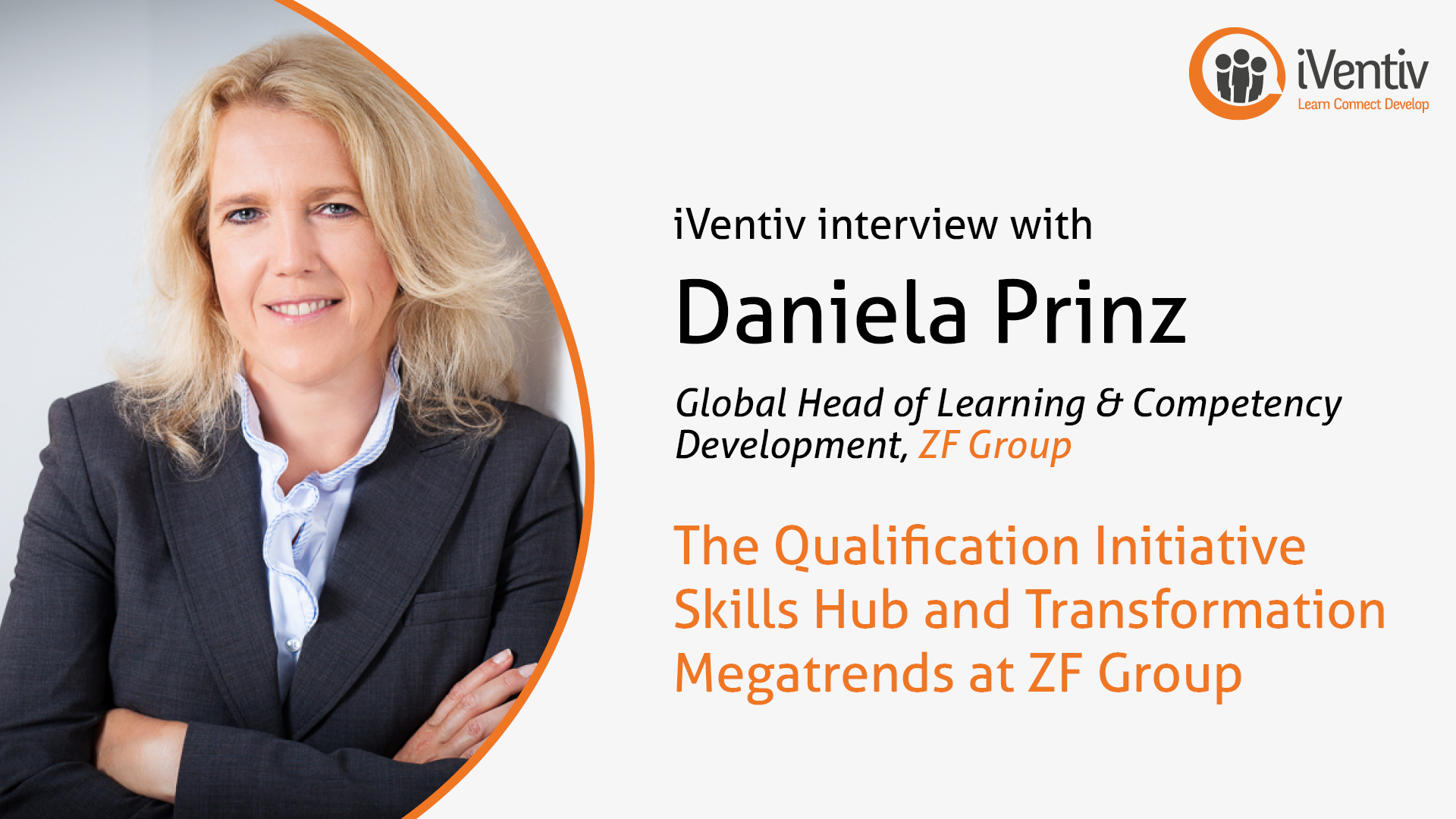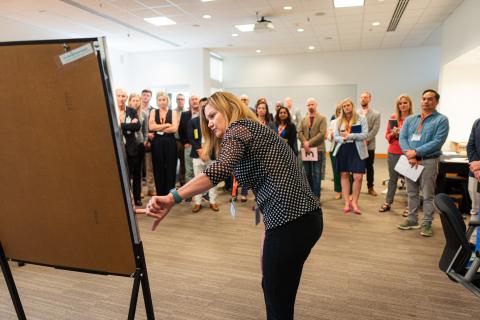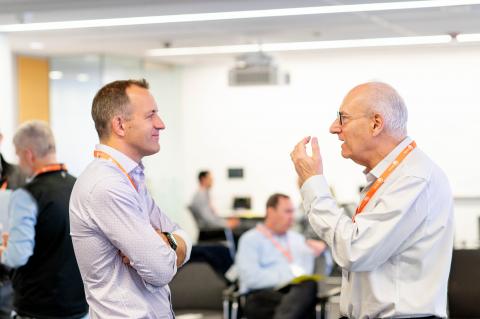Submitted by networkadmin on
As a leading player in the transformation to a technology-driven enterprise, ZF Group has launched the Skills Hub to address the evolving needs of its global workforce. Daniela Prinz, Global Head of Learning & Competency Development at ZF Group, sheds light on how this platform is pivotal in supporting employees as they navigate through the megatrends of e-mobility, digitalisation, and sustainability.
The Skills Hub isn't just a learning tool; it's a change management catalyst designed to enhance the skills and competencies necessary for ZF's transformation.
In this interview, we'll explore how the Skills Hub and other strategic L&D efforts at ZF Group are not only reshaping the way employees grow professionally but also ensuring that the company remains competitive and forward-looking in a rapidly changing industry landscape.
Watch our interview with Daniela and read our blog below to examine the integral role of skills development in organisational success and sustainability.
The Skills Hub - an Essential Evolution in Response to Transformation Megatrends
Daniela Prinz, Global Head of Learning & Competency Development at ZF Group, joined us to discuss the Qualification Initiative Skills Hub at ZF Group, describing it as a key tool in the company's transformation from a traditional combustion engine company to a high-tech firm.
Daniela introduced the Skills Hub as a change management instrument designed to help employees adapt to major industry megatrends such as e-mobility, digitalisation, and sustainability. Currently, about 90,000 employees globally could use the Skills Hub, with 20,000 active users and 8,000 monthly users completing approximately 5,000 courses - an uptake that she says underscores the platform's significant role in supporting the workforce through this transition phase.
What Key Skills are Focussed on at ZF Group?
Daniela highlighted the current focus on key skills at ZF Group, emphasising the importance of soft skills and change management over traditional functional skills. She explained that understanding industry changes and adapting to them are crucial, particularly given the organisational shifts and uncertainties ZF Group is experiencing. The Learning & Development team at ZF, she says, is tasked with not only understanding these soft skills but also the functional skills necessary to drive the company's transformation.
It is important for L&D to also grasp the technology behind learning platforms to ensure these are engaging and effective for employees. The approach ZF Group have taken regarding this is to equip the workforce with agility through learning, ensuring the L&D offerings are appealing and conducive to employee development in a dynamic environment.
Defining Reskilling and Transformation at ZF Group
Daniela defines a skills-based organisation as one that prioritises the unique skills of individuals over traditional job roles or organisational structures - a focus that, she says, facilitates the development of employees' competencies and potential beyond conventional limits.
Daniela draws from her background in recruiting to compare the evolving role of Learning & Development to recruitment, emphasising the shift towards growing employees internally rather than relying on external hiring. This internal development strategy aims to broaden the skill sets of a wide array of employees, fostering a more flexible and capable workforce during times of significant organisational change.
The Role of the Learning Team in Growing a Skills-Based Organisation
The Learning Team at ZF Group, Daniela tells us, is tasked with fostering a culture of flexibility, agility, and innovation. They encourage employees to actively participate in their own career development, offering structured career paths and supporting them in taking charge of their professional growth.
This strategy, for Daniela, aligns with the broader organisational shift towards internal development rather than external hiring, promoting a more sustainable and impactful approach to employee growth.
She goes on to emphasise the importance of developing skills that enable natural progression from one role to another, rather than merely climbing the traditional job ladder. This approach is seen as more aligned with the desires of employees who prefer to evolve within their current roles, contributing to a more dynamic and adaptive organisational culture.
Skills, Skills, Skills – is this a Concept that is Here to Stay, or Just Another Megatrend?
Daniela addressed the relevance and staying power of the skills concept within organisational development at ZF Group, arguing that the focus should not solely be on the quantity of skills catalogued in a database but rather on how these skills are effectively applied and developed within the workforce.
She emphasised that the crucial factor is the application—the "how" rather than just the "what." This approach has been validated by the need for transformation within companies, where skills have proven to be a solution to evolving challenges.
She also points out that major tech systems like SAP and Workday are integrating skill management into their platforms, indicating a significant trend towards recognising and enhancing skill management through technology. This adoption across technological solutions supports her belief that the skills concept is more than just a passing trend and is here to stay, particularly in the context of navigating the complexities.
The Value of Collaboration
Daniela reflected on her previous experiences at iVentiv events, and emphasised the importance of gaining diverse global perspectives when it comes to L&D.
She said that she values these exchanges for the insights they provide into various industry practices and the reciprocal benefits of shared experiences.
Such interactions, she said, leads to ongoing dialogues, where leaders help each other solve problems and share feedback, which she finds mutually beneficial. This approach underscores her belief in the power of collaboration across borders to enhance learning and development within the organisation.
After spending years in consulting, Daniela Prinz now has the privilege to work with an inspiring team of HR professionals across the globe as Global Head of Learning & Competency Development at ZF Group, supporting agile transformation and operational excellence. Daniela has a broad knowledge on HR topics from planning to learning, and previous experience as Executive Search Consultant on senior level.
Frequently Asked Questions
How does the Skills Hub support ZF Group's workforce?
The Skills Hub serves as a change management catalyst that enhances skills and competencies necessary for ZF's transformation, supporting about 90,000 employees globally, with 20,000 active users and 8,000 monthly users completing approximately 5,000 courses.
How Should L&D teams at facilitate employee development?
Learning & Development teams should ensure learning platforms are engaging and effective, focusing on equipping the workforce with agility and appealing L&D offerings that support dynamic employee development.
What defines a skills-based organisation according to ZF Group?
A skills-based organisation at ZF Group prioritises the unique skills of individuals over traditional job roles or structures, which facilitates the development of employees' competencies beyond conventional limits.
How does ZF Group's L&D approach compare to traditional recruitment?
ZF Group's approach to L&D is compared to recruitment, with a focus on growing employees internally through skill development instead of external hiring, aiming to broaden skill sets across the workforce.
The skills concept - is this considered a temporary trend or a lasting practice?
The skills concept is viewed as a lasting practice by Daniela, who says that it is crucial for the company's transformation and sustained by the effective application and development of skills within the workforce.










